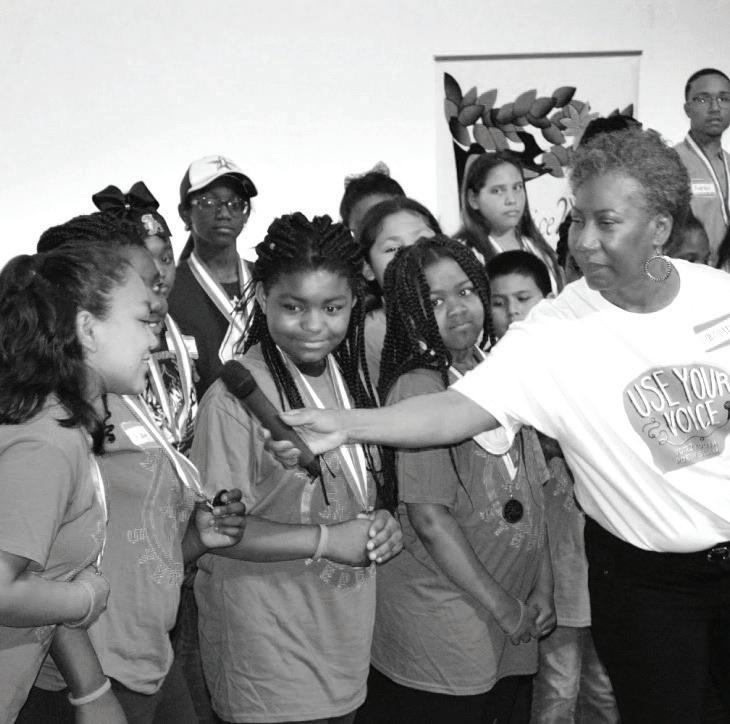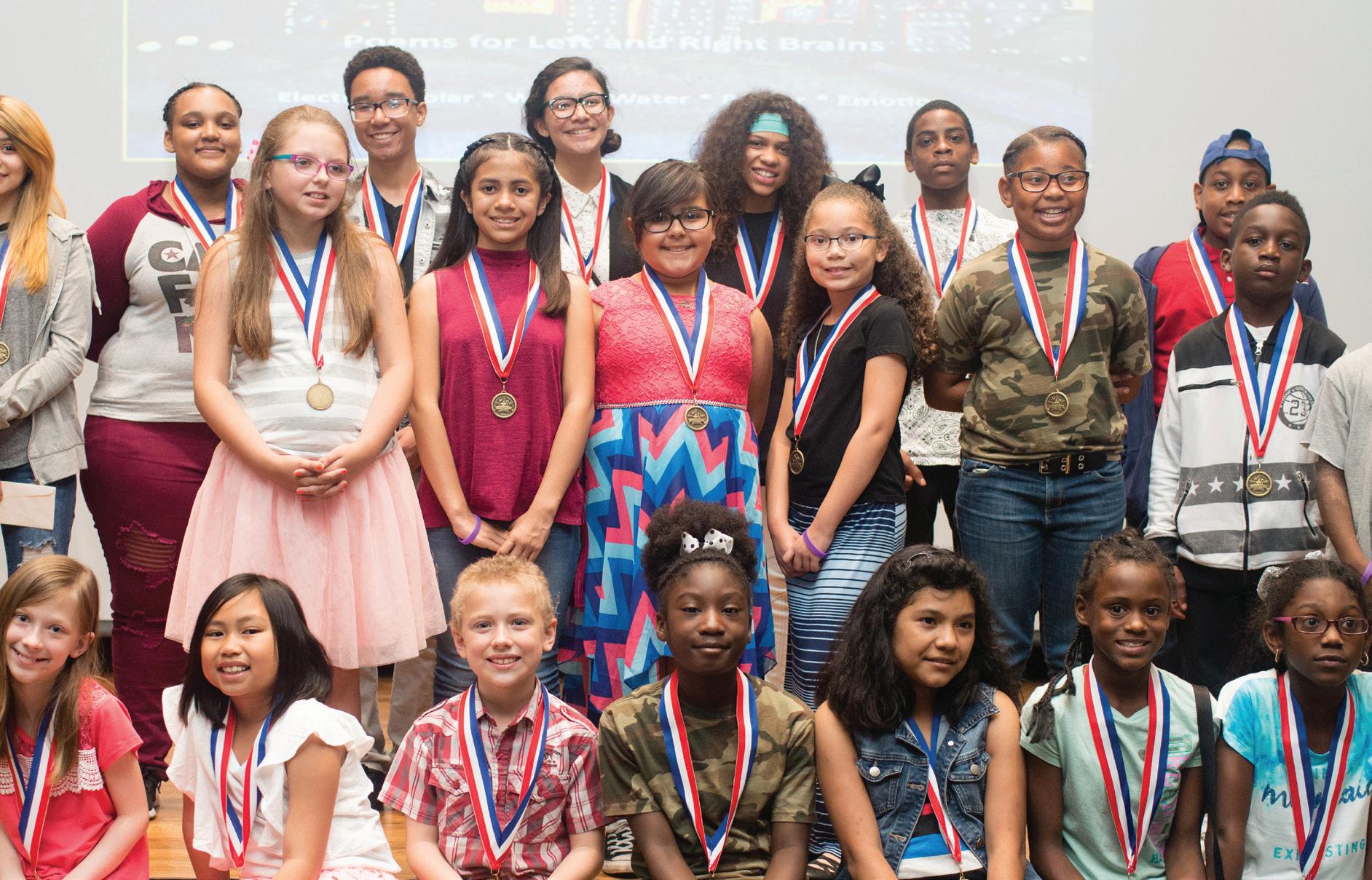
4 minute read
Power in Poetry
from OTK Issue 09
by One To Know
Carolyn West recognized a need in the Fort Worth community. Now, she’s taken students to new heights with the Thank You Darlin’ Foundation’s poetry-centered program.
By Jill Bold
Advertisement
carried the power of that performance into her mission at Thank You Darlin’.
This simple adage encapsulates the mission and the impact of the Thank You Darlin’ Foundation, a 501(c)(3) public charity that works with Fort Worth students to unleash their critical thinking skills and literacy through poetry. Founder Carolyn West uncovered a need in the community after reading a 2006 Fort Worth Star-Telegram article about educators who were perplexed as to why their students’ writings were flat. She knew that poetry was the vehicle to transport these students to greater academic achievement and understanding.
Carolyn fell deep into the world of poetry unexpectedly through her daughter, Autumn. One Friday night, Autumn cryptically asked Carolyn if she could give her and four of her friends a ride back up to school. She did, and upon arrival to a nearly full parking lot and a bustling auditorium, Carolyn took a seat in the audience. To her surprise, Autumn took the stage to read a poem and received a standing ovation.
“So many folks were there to hear children speak — not turn flips, not dance, not play musical instruments — to speak,” Carolyn says, as she recalls the impact of what she witnessed. “Do you know how incredible that is?” Carolyn
The foundation helps students develop the ability to write and communicate and provides an education on poetic technique. A session with the children will start with a free write: an opportunity for them to express what’s on their minds. Carolyn plays music during these sessions to inspire the children to tap into their creativity. After filling up their journal pages, students will share their writing with everyone. This technique introduces them to public speaking.
Many of these students are shy, and reading their thoughts aloud prepares them to master speaking before an audience. After this warmup, the class studies a poetic technique to activate their critical thinking skills and foster teamwork. Students collaborate as they analyze the works of various poets, practicing comparing and contrasting poems.
These students will showcase their talents in poetry slams. The poems, written by the students themselves, are not merely read; they are performed. They incorporate choral speaking and performance techniques, and the competition awards monetary prizes for the top three performers across three age categories.
Students perform their own original poetry at a poetry slam where contestants of all different ages can win monetary prizes.
The students have performed at libraries, the Botanic Garden, the historic I.M. Terrell Academy for STEM and VPA and at TCU, exposing many underprivileged youth to a college campus. The foundation’s limited budget means finding a venue can be a challenge, but in the end, the students put on a tremendous show.
“We have been turning straw into gold for years,” Carolyn says.
Through the foundation, students have the chance to publish their work. These children from marginalized communities have the opportunity to share their talents, chronicled in eight anthologies that the foundation has published. The subjects of these books vary widely, like Science and Energy Poetry: Poems for Left and Right Brains.
“Poetry is a way to teach literacy, and it can teach about almost anything, even science and energy,” Carolyn says.
The poems in this anthology relate to electric, solar, wind and water power, as well as emotion. In a session with the children, the foundation brought engineers in to talk to students about renewable and nonrenewable energy.
“We’ve talked about how a volcano exploding could be a metaphor for someone’s emotions,” Carolyn says.
The impact of a powerful poem can have a profound influence on a young person. Carolyn recalls a former student in the program named Jesse, a young man who gravitated toward Carolyn’s acrostic poem, “Peace.” Each line of that poem began with each of the letters in the word “peace,” giving the poem a deeper meaning. She led a session with the children where they studied its content, and when she moved on to the next subject, Jesse wasn’t ready. He wanted to continue to teach peace. His empathetic mind formulated a plan to carry it out — he wanted to distribute copies of the poem in hopes that those who would read it would know peace.
The name “Thank You Darlin’” is derived from the memory of a woman who brought peace and made people feel warm, loved and valued. The organization was founded to honor Carolyn’s mother, who passed away after a battle with cancer. In her final days, Carolyn’s mother could always muster the strength to say, “Thank you, darlin’” and express her love despite her illness.
In its early years in Illinois, Thank You Darlin’ Foundation worked to help women. Carolyn’s life experience in a “sandwich generation” — when a person is simultaneously caring for children and aging parents — led her to serve the women in her community. After a move to Fort Worth in 2004, the foundation shifted its focus to address the community’s academic concerns for its students. The foundation has grown to include a board of directors, consisting of five women who bring their experiences in nursing, investing, workforce development, engineering and art to serve the foundation. Their next goal is to expand the board to nine, hoping to elevate their ability to earn grants and fundraise — more money to serve more schools and hire more teachers. Potential new board members with marketing or fundraising experience can help the foundation grow and serve the Fort Worth students.
“It is wonderful to see how kids progress so quickly when you just support them and encourage them,” says Debbie Ursini, board member and visual artist and poet. “Sometimes they don’t know they can do things until you show them that they can.”

Vision boards help us get our thoughts and ideas down on paper and remind us of our intentions. Let’s set goals in different areas in your life and help visualize what you want to achieve this year.









